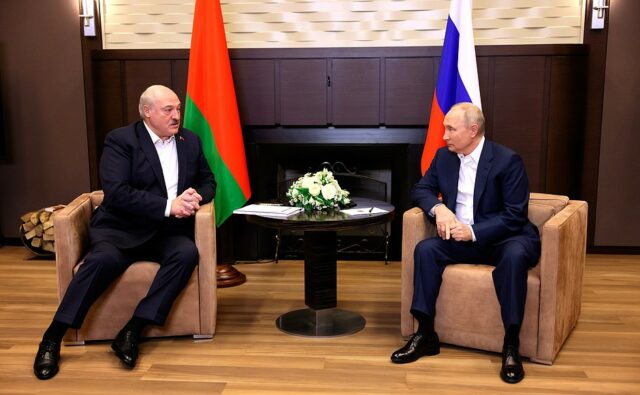
The West’s Approach to Belarus Pushes Minsk Closer to Moscow
Publication: Eurasia Daily Monitor Volume: 20 Issue: 153
By:

Western policy toward Belarus depends on policymakers’ willingness to scrutinize the facts on the ground. In this regard, two narratives undergirding the West’s approach are at war with one another. Some argue that Belarus has become inseparable from Russia and that there is no need to differentiate policy measures between the two, including extensive sanctions. Others point out that, though Belarus is overly dependent on Russia, there are clear signs of Belarus’s autonomy. Punitive measures from the West that further suppress this room for maneuver will likely push Minsk deeper into Russia’s orbit (see EDM, July 19, August 2, September 7).
The “provisional cabinet” headed by Vilnius-based Svetlana Tikhanovskaya is a proponent of the narrative that Belarus has become a mere vassal of Russia. In one recent example, cabinet member Pavel Latushko, former minister of culture and former Belarusian ambassador to Poland, recently described the September 15 meeting between Belarusian President Alyaksandr Lukashenka and Russian President Vladimir Putin in Sochi as evidence of Belarus’s status. According to Latushko, Putin insisted on Lukashenka fulfilling his earlier promise to resign, though he provides little evidence to back up his assertion (Svaboda, September 16).
Past Russian actions give some credibility to Latushko’s hypothesis. During the post-election protests in 2020, Moscow acted on the conviction that Belarus was ripe for change at the helm of power (Radio Free Europe/Radio Liberty, August 6, 2020). The Kremlin proceeded from the notion that it would be possible to effectively manage the transition through early elections and the quiet departure of Lukashenka, who had lost significant electoral support. On several occasions, Lukashenka himself confessed publicly that he perhaps had overstayed his welcome.
With its war against Ukraine, however, the Kremlin’s willingness to dispose of a trusted ally has become highly unlikely. Lukashenka’s control of his “power vertical” is so tight that the Kremlin has few pragmatic options for replacing him. Alexander Klaskovsky, a veteran opposition journalist, suggests that Latushko’s hypothesis is based on dubious evidence. Klaskovsky points out that the presence of the head of the Russian Presidential Administration, Anton Vaino, at the Sochi meeting does not mean Putin actually asked Lukashenka to resign (Udf.name, September 26). Yury Drakakhrust of Radio Free Europe/Radio Liberty seconds Klaskovsky’s opinion. According to him, it is rather doubtful that Moscow will be able to install its chosen candidates during the upcoming 2024 parliamentary elections in Belarus (Euroradio, September 28).
Official Minsk’s efforts to keep Belarus directly out of the war next door highlights its autonomy from Russia. In an interview on September 26, Belarusian Foreign Minister Sergei Aleinik declared that he cannot envision a situation in which his country would enter the war against Ukraine alongside Russian forces. Aleinik added that he cannot imagine the actual circumstances that would lead Russia to order Minsk to use the tactical nuclear weapons recently deployed to Belarusian territory (Svaboda, September 27).
Belarus, nevertheless, continues to support many of the Kremlin’s policies. For example, the Belarusian state agency for fighting organized crime, of all entities, criticized the education system for publishing 11th grade textbooks that still show Crimea and the Russian-occupied eastern regions as belonging to Ukraine (Express.by, September 12). Elvira Mirsalimova, an ardent pro-Russian activist in Belarus, called attention to 10th grade textbooks that still did not recognize the annexed Ukrainian regions as rightfully belonging to Russia (T.me/e_mirs, September 28).
Given this delicate juggling act, the West might assess whether its policies of further isolating Belarus only serve to strengthen Minsk’s connections with Moscow (Russiapost, August 30). On July 10, Pavel Evseenko, chargé d’affaires of Belarus’s Permanent Mission to the United Nations, sent a complaint to UN Secretary-General António Guterres regarding Lithuania’s role in blocking Belarusian potash exports that had been transported via the Port of Klaipeda (Un.org, accessed October 3). Due to the blockade, Belarusian potash exports have decreased from 9.1 million tons (December 2021) to 3.9 million tons (December 2022). Belarusian exports used to satisfy 20 percent of global potash consumption. Potash prices have skyrocketed, as a result, causing the most harm to the poorest countries in the Global South. One may justifiably claim that Belarusian officials are more concerned with the loss of revenue than they are about world hunger. Even so, Western leaders need to consider: do punitive measures against Minsk push Belarus in the right direction or reinforce Moscow’s preferred outcomes?
This is not to say that the West’s desire to hold Minsk accountable for its policies is off the mark. Repression in Belarus continues, and some personal accounts are rather heart-wrenching (Gazetaby, September 23). The migration crisis lingers along the Belarusian border, and Belarus’s western neighbors blame it on Minsk’s actions. According to Artyom Shraibman, an exiled Belarusian analyst, Minsk hoped to assuage migration-related concerns in Warsaw, because nearly all remaining Belarusian transit with the European Union goes through Poland. As a result, Belarusian officials transported quite a few illegal immigrants from the border with Poland to the border with Latvia. Riga closed one of its border crossings with Belarus in response (YouTube, September 29).
The antagonism between Belarus and its Western neighbors make it seem unlikely that they would ever agree on global issues. Yet, this is precisely what happened with the scandal over the Canadian parliament’s honoring of the 98-year-old Nazi Schutzstaffel veteran Yaroslav Hunka on the grounds that he fought against Russia. Belarus (Mfa.gov.by, September 26) and Poland (Notes From Poland, September 26) issued identical reprimands for the spectacle. This shared response underscores the opportunities for Belarus and its European neighbors to find common ground on some matters and possibly build stronger bilateral ties from there—or at least experience working with each other.
Facts on the ground point to a Belarus that remains distinct from Russia. Central and Eastern Europe is more nuanced than the West’s approach to the region might suggest. Overcoming this imbalance may be a worthy undertaking.



